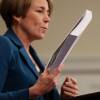An overdue $56.2 billion dollar state budget landed on Gov. Maura Healey’s desk Monday after weeks of closed-door talks that culminated with overwhelming votes in the House and Senate.
Only two of the current 199 state lawmakers, Republican Reps. Marc Lombardo of Billerica and Nicholas Boldyga of Southwick, voted against the compromise budget that a six-lawmaker negotiating team filed Sunday night.
Healey gets 10 days to review the bill and decide if she wants to issue any vetoes or amendments.
Talks between the House and the Senate stretched a full month into the new fiscal year, making Massachusetts again one of the last few states in the country without a full budget in place. Healey signed a second stopgap budget earlier Monday to make sure state government remains operational during her review period.
House budget chief Aaron Michlewitz, who led the negotiations with Sen. Michael Rodrigues, said the budget included “a lot of complex policy pieces ... that took a lot of time to iron out between the two branches.”
“Certainly we had some work to do, and it took some time,” Michlewitz, a North End Democrat, told GBH News. “But I'm proud that we are able to get it done. And there’ll be some real impactful things that come out of this budget, and I look forward and hope that the governor will sign it.”
Policy items within the budget include:
- Language that would make undocumented immigrant students eligible for in-state tuition rates and state financial aid at public colleges and universities, as long as they attended a Massachusetts high school for at least three years and graduated or got their GED here. House Republicans attempted a procedural move to debate whether this section should be struck from the bill, but were shot down by the Democratic supermajority.
- A requirement that corrections officials make phone calls free for people incarcerated in state prisons and county jails.
- A two-year pilot program expanding ConnectorCare, the state’s subsidized health insurance program, to include people earning up to 500% of the federal poverty level. The advocacy group Health Care For All estimates that the pilot will lower costs for around 50,000 to 70,000 people.
- The addition of two new seats to the MBTA board, including one representing the city of Boston.
- An initiative requiring schools to provide free meals for all students, extending a pandemic-era program previously funded by the federal government. Lawmakers support universal school meals in part with money from the state’s new “millionaire’s tax,” an extra 4% surtax on income over $1 million.
The budget also steers $20 million into a program called MassReconnect, which Healey proposed while running for office last year. Slated to start this fall, MassReconnect will cover community college costs for students 25 and older who don’t already have a degree.
Lawmakers agreed to build on MassReconnect by also eliminating community college costs for nursing students. Senate President Karen Spilka wants to make community college free for all students by fall of 2024.
There are no tax breaks in the budget, but it does set aside $581 million for a tax relief package that’s also been bottled up for weeks in closed-door talks between the House and Senate. Last year, legislators were unable to finalize a tax relief bill and picked the work back up this session.
Rodrigues and Michlewitz are also leading the effort to reconcile competing House and Senate tax relief bills. Michlewitz predicted Sunday that a deal won’t emerge until after Labor Day.
“But certainly we're going to continue to keep those negotiations going,” he said. “I think we are both very aware that we need to kind of get this done, and as quickly as possible.”
Rodrigues, a Westport Democrat, said his goal is to reach a deal “as soon as possible.”
“Democracy is painstakingly slow,” Rodrigues said. “The deliberative process can be very slow at times, and I always quote Winston Churchill who said democracy is the worst form of government, except for all the others.”








